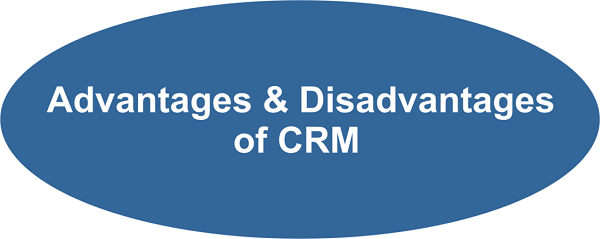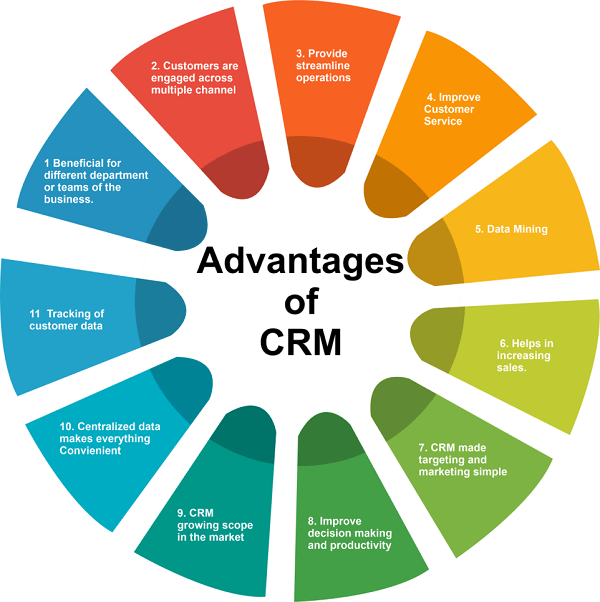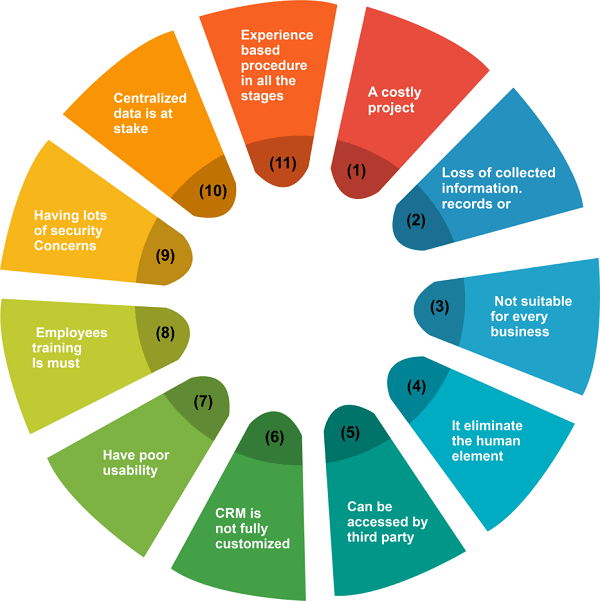Advantages and Disadvantages of CRMEvery business is planned, established, and run on based of its customers. Customers are like the blood of every business, without which business organs can't function. Happy customer reflects the quality and growth of any business. With the evolution of technology, the business also adopts digital platform and start interacting with customers. Technology has helped the business to reach its customers within a second. But more than interaction is needed in the long run, a business must maintain the satisfaction and happiness of its customers and it comes by solving their problems. This can be done by creating a relationship with the customers, a deep necessity for the business. To do this, CRM came into existence where CRM stands for Customers Relationship management which is a vast concept to understand. CRM is an integral part of any business's success that helps businesses to build strong customer relationships and by the quality of conversation with prospects and customers. It also helps a business to do its marketing, increase its sales and make a high rate of profit. In the digital world, "Customer relationship management is a software that makes business to nurture its relationship with customers by communicating them that give customer a better experience and realize them that business concerned about their needs." CRM = software that allows businesses to create and keep customers with some terms and conditions. In short, customer data is centralized under one roof that individuals and businesses can access to expand their work. 
Rather, we will discover numerous definitions or wordings about CRM on Google in searching about CRM, but in short, customer relationship management collectively refers to these:
Here's the list of some functions performed by the CRM tool
Customer relationship management tool collects all these types of information about customers:
Components of CRM
Advantages of CRM
1. Beneficial for the different departments or teams of the business Customer relationship management automation systems can benefit small and large businesses and their teams, such as marketing, sales, customer service, field service, and project service automation teams in different aspects. Together they raise the business's growth chart by increasing the product's productivity. With this, CRM is capable of improving and simplifying complex customer engagement. 2. Customers are engaged across multiple channel There are various advantages of using a CRM system for a business as it provides the best possible customer service by improving customer service, customer retention, tracking customer data, streamlining operations, reducing costs, and taking the business to the next level. The CRM can engage the user with its customer across multiple channels like email, social media, live chat, and phone. You can connect with your customer on any platform and track customer interaction in one place, which helps get a complete picture of each customer. 3. Provide streamline operations A properly implemented CRM in business provides streamlined operations by automating tasks such as order fulfillment, customer contact management, and lead tracking. Streamlining the functioning of CRM operations helps focus on more strategic activities for the business and saves money and time. 4. Improve customer service Customer relationship service is designed to interact with customers and store their data in one place. It helps in maintaining good customer relationships and gives customer satisfaction. With the help of CRM, the customer service team can listen to customers' problems and resolve them quickly and efficiently. With this, teams can contact every customer to offer assistance before problems arise. 5. Data mining CRM (customer relationship management) software stores customer data in one place and allows people to discover progress areas, creating a real-time business environment where the user can make instant changes. With this, we can analyze the CRM or business performance. 6. Helps in increasing sales As with CRM, the customer service team can reach every customer that increases the sale of every business and track the progress of each sale opportunity. This information will be used to tweak the sales process and apply ways to increase the chances of sales. It is a lead management tool with which we can keep an eye on what works well or is not. 7. CRM made targeting and marketing simple CRM can collect all the customer information to help a company focus on specific customers with different marketing strategies to increase product sales. The sales team collects and studies all this information to create new strategies to pitch the new product offers to the customer's and resulting in the product's sales increment. Due to this, customers receive the desired product and services, which make business collect the customers' responses. 8. Improve decision-making and productivity Artificial intelligence-powered customer relationship management software help business make a faster and smarter decision. AI can collate data from customer interactions and track customers across mediums and devices. For certain CRM operations, most customers use self-service channels such as customer portals or knowledge bases for simple issues and questions. 9. CRM growing scope in the market Companies use customer relationship management tools to survive in the competition of growing databases. It becomes difficult to meet the specific need of the increased number of customers personally because each interaction needs a specific commitment from CSR (customer service representative). The CRM software tool can be tailored to fit any budget and help the companies to grow and expand themselves while fulfilling the requirement of customers. 10. Centralized data makes everything convenient. All the gathered data is stored and maintained at one centralized location in CRM, which can be easily accessible to those who require it to function properly. In CRM, an employee or user can quickly find the required information without going through multiple data points, saving an employee's time. It also makes employees efficient and productive employees who can devote more time to solving other issues of the customers & company. 11. Tracking of customer data Valuable collected data give an insight into the need of customers, problems faced by them, correction required, and how you can serve them better. Collected data can be tracked and saved in a CRM system that provides an overall view of customers about your product and business. As CRM integrates all the data under one roof collected from various means (online transactions, customer service inquiries, by-sale meetings, etc.), automation tools make it easier for the team to track required data in minutes without any mistakes. Disadvantages of CRM
1. A costly project CRM software tool is an expensive investment that some businesses can only afford, and if they do invest, it doesn't guarantee the return on investment is worth it. It is a huge investment that factors like data mitigation, integration cost, training, and support also affect. Even for a locally hosted customer relationship management system, the company is associated with overhead costs because they require to pay professionals like software developers, system administrators, and maintenance personnel. These people ensure that the software works properly and maintain the data backups, too that also an expense with running a customized CRM. 2. Loss of collected information or records CRM (customer relationship management) tools can be responsible for losing the customer's information as some CRM software keeps track of customers' information using remote internet connections. Due to this, sometimes organization needs to have control over the customer's information (detailed), especially when a system failure event happens. An unstable CRM can result in the loss of money in revenue for the company in the future. 3. Not suitable for every business Every business can't afford CRM for data collection and connecting with customers. Some businesses can't correct to the customers directly therefore, they don't need a CRM tool. Forming CRM to make it function properly company or business has to spend a lot of money, including various phases. 4. It eliminates the human element. CRM is a fully automated tool that has prevented human intervention. It automatically collects all the data and processes it. CRM efficiently manages the relationship between the company and customers as it directly interacts between people and its staff. Customers can shift anywhere due to the loss of human touch, reducing sales and revenue. 5. Can be accessed by the third party As we know, CRM collects customers' sensitive information and stores it, which other parties can misuse. For example, web hosting companies take and sell collected data to a third party that misuses the data and causes loss to people. 6. CRM is not fully customized A business can only customize a CRM system and make CRM fit their specific needs and requirements. It can create problems for CRM users; they get frustrated and need help to make the system work according to their requirements. 7. Have poor usability Some CRM systems could be more user-friendly as users need to learn how to use CRM to save time and energy to make the system work according to them. Some small businesses try to refrain from using CRM as they need help handling it. 8. Employee training is a must. No doubt, CRM installation is fast and easy in the system & is also an exciting experience for the employees as it is a fully automated process where data can be streamlined in one place. But everything changes when its implementation begins as CRM is not fully customized therefore, sometimes implementation doesn't go along with the system configuration. Despite being an expert, the staff is trained to become accustomed to CRM and learn to use it properly. 9. Having lots of security concerns There are many security issues with CRM, such as data loss and data being hacked by someone. In CRM, the collected data is stored at one centralized location that can be accessed by unfair means. In another case, inaccurate data can be added by employees, or they manipulate figures leading to wrongful planning. 10. Centralized data is at stake. In CRM, stored data is not disturbed. Otherwise, it is centralized, which can be at stake or lost due to hackers or unfair means. Whole data is affected when attackers try to steal it, or staff or employees are fed the wrong information. 11. Experience-based procedure in all the stages Small businesses may not require it, but large businesses use CRM on a large scale. For this purpose, they train their employees by providing training sessions from the appointed professionals. The company invests in employee training to improve its productivity, where employees encounter and learn the various features and functions of CRM. This experience will help them in all the stages of CRM. Conclusion:Business is an ongoing process that has to update itself with time (adopt new technologies) to remain in the competition. Before technology, customer data or CRM was based on papers, but slowly, companies started tracking customer-related data with spreadsheets, emails, address books, and other ways. But due to a lack of automation and integration, it becomes difficult for them to find and share up-to-date information when required quickly. It also down their ability to create marketing strategies, provide customers flawless service, and peruse new sales leads. CRM is a powerful tool that automatically collects information about existing and prospective customers (their personal or professional information, including social media posts, phone numbers, email addresses, phone numbers, service, purchase history, and support tickets). Further, the whole information is integrated by the system and generates consolidated profiles that can be shared with appropriate teams. One of the best features of CRM is that it can connect with other business tools, such as document-sharing apps and online chat. Artificial intelligence and business intelligence capabilities are built in CRM that accelerate administrative tasks and provide actionable insights. Customer relationship management's advantages and disadvantages will help you understand it in detail.
Next TopicAdvantages and Disadvantages of Firewall
|
 For Videos Join Our Youtube Channel: Join Now
For Videos Join Our Youtube Channel: Join Now
Feedback
- Send your Feedback to [email protected]
Help Others, Please Share










